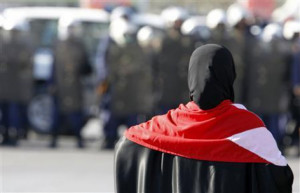
To be fair, it is important to note that this crisis didn’t arise recently but back in 2011 when, following Tunisia and Egypt, Bahrain saw the so-called “pearl” revolution take place on its territory (the Emirate is famously the centre of the natural pearl industry, which is highly valued on the international market). The events saw the Shiite population, which according to official figures makes up 75% -80% of the total population, rise up in protest. The revolution was quashed by Saudi forces that occupied the Emirate.
However, the Shiite population’s fight for its rights didn’t end there and continues to this day. The fact is that the Shiite population is considered second-class citizens on their own territory. Power is entirely concentrated in the hands of the minority Sunni leadership that is headed by the Khalifa family who have ruled over the Bahrain Archipelago for centuries. The government is rarely changed and it goes without saying that it is made up entirely of Sunnis. The main governmental posts in the Kingdom are occupied solely by Sunnis and Shiites in general are in the lower ranks. Shiites, for example, cannot serve in the military or police forces, even their children go to separate schools and don’t have any contact with Sunnis. Sunnis enjoy far more favourable conditions in terms of the loan policy of banks than Shiites, which is testament to the discriminative policies of the Bahrain authorities. To further illustrate this point, it might be noted that Bahrain law denies Shiites the right to live in approximately 40% of Bahraini territory.
Political parties are completely banned. Therefore, the leading political power of Bahrain, the Shiite Al-Wefaq, stands no chance of winning the elections to the lower parliamentary house. Moreover, according to Newsru.co.il, the Ministry of Justice has declared the party illegal. It should be remembered that the Al-Wefaq party asserted itself against the backdrop of the events of the Arab Spring in 2011 when it organised the mass protests of the Shiite population, which was only finally suppressed with the intervention of Saudi Arabia. Since then, for the last five years, Al-Wefaq has been fighting against the regime of King Hamad bin Isa Al Khalifa. In turn, the royal authorities have been actively repressing the Shiites in Bahrain. In particular, in October last year, the head of the Al-Wefaq human rights and freedoms department, Hadi al-Musawi, said that in 2015, 340 opposition members had been sentenced to various prison terms with a total term of 2,783 years.
The Judiciary of Bahrain ordered the closure of all the offices of the large Shitte opposition party Al-Wefaq and that its bank accounts be freezed. Furthermore, the Kingdom’s security forces organised checks of the Shiite organisations for illegal foreign financing. The leaders of several organisations were put under house arrest during the investigation.
The Secretary General of the Gulf Cooperation Council (GCC), Abdul Latif al-Zayani, said that the countries of the Council “support the measures that the Kingdom Bahrain has taken in relation to associations and organisations that conduct activities in breach of local laws, sow interfaith intolerance, promote division and violence for the purposes of fulfilling the aims of external forces that do not share the interests of Bahrain and its people and seek to undermine its stable development and security.” He added that the Gulf countries support Bahrain’s efforts to develop democracy and a political system by undertaking reforms that are removed from external interference, or foreign political or religious doctrine.
Naturally, the Saudi government spoke out in support of the recent decisions made by the authorities of Bahrain, including the decision to revoke the citizenship of the famous Shiite spiritual leader, Isa Ahmed Qassim, as was reported in a statement following a Cabinet meeting on Tuesday.
However, it should be pointed out that a number of states condemned the Bahrain government. For example, the USA and the UN sharply criticised Bahrain for its repression of Shiites and the decision to revoke the citizenship of their main leader, the Ayatollah Sheikh Isa Ahmed Qassim. This decision, made by Bahrain on 20 June, caused public outcry and warnings from Tehran that it may provoke an armed uprising, Adama Dieng, the UN Secretary-Genera
It was Iran in particular that had the strongest reaction to the recent events. FARS news agency reported that Major General and Commander of the special al-Quds Force, part of the Iranian Army of the Guardians of the Islamic Revolution (IRGC), Qasem Soleimani, warned the Bahrain authorities not to put pressure on the Shiite spiritual leader Isa Ahmed Qassim. He, in particular, said that should there be any disrespect or attacks on the Shiite spiritual leader, “the overthrow of the regime would be only a small part of the consequences, which would also include armed resistance within Bahrain.”
The fact is that the strong historical ties between the population of Bahrain and Iran should not be ignored. Back in the 9-11th centuries, Bahrain was a stronghold of the state of the Carmathian sect (a radical offshoot of Shiism, who stole the Black Stone of Mecca for a time, which was returned after paying the ransom to the Carmathians). Subsequently, Bahrain has repeatedly been under the authority of Iran, in particular, during the reign of Iran’s Shiite Safavid dynasty. Therefore, the Shiite community of Bahrain has a long historical tradition and is not willing to tolerate the domination of Sunnis in the country.
Therefore, we can say that the dangerous process set in motion by the “pearl” revolution continues, and the Shiite protest in Bahrain has only been temporarily driven underground by the repression and continues to smolder. It would seem that, alongside repression, the Bahraini authorities need to think about radical transformations in various areas of life to benefit the Shiite majority.
Viktor Mikhin, corresponding member of the Russian Academy of Natural Sciences, for the online magazine “New Eastern Outlook.”
